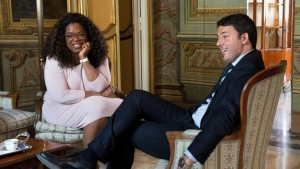As Italy moves closer to legalizing civil unions, despite opposition by Catholics and (surprisingly) even some non-religious groups, Pope Francis faces a difficult test of his role as Bishop of Rome and Primate of Italy. Will he speak boldly in defense of marriage, as he did in his native Argentina in 2010, or will he sow greater confusion, as he did in the immediate aftermath of the 2013 conclave?
In addition to leading the universal Church, the pope is also the Bishop of Rome and Primate of Italy. Although the three most recent popes have not been Italians, they all recognized these functions. St. John Paul II, Benedict XVI, and Francis have traveled extensively across Italy and have been dynamic pastors of the Archdiocese of Rome.
Francis is arguably the most “Italian” of the three. Even though he is Argentinean, he is also the son of an immigrant from Italy’s Piedmont region. In Argentina, 40 percent of the population claims Italian ancestry and is culturally to Italy what Boston is to Ireland.
Francis has made many pilgrimages across Italy, from Lampedusa in the South to Turin in the North, attracting large crowds. John Paul and Benedict spoke in various languages during their Wednesday audiences; Francis has largely stuck to Italian. Though Francis has elevated several bishops from the “peripheries” to the College of Cardinals, about a fifth of his picks have been Italians, more than any other nationality and a larger proportion than John Paul’s choices.
Italy loves him. Francesco is the most popular name for Italian babies, while according to Pew, 91 percent of Italians think favorably of the pontiff, the same as in his native Argentina (he is more popular only in Poland). Italians see Francis, professed fan of pasta and Fellini, as almost one of their own. Sociologists note that Francis’ popularity has caused church attendance to spike in Italy.
Matteo Renzi, Italy’s prime minister, is among the pope’s admirers. Renzi regularly attends Mass and for years was involved in Italy’s Catholic scouting movement. His brother-in-law is a priest; his wife used to be a catechist. You might expect that Renzi would promote traditional morality in the Italian public square, decades after the Italians legalized abortion-on-demand in a referendum.
Wrong. Like Nancy Pelosi or John Kerry in the United States, or the Aquinos in the Philippines, Renzi has no qualms about publicly displaying his Catholicism, but his faith doesn’t affect his policies. Renzi recently introduced legislation to legalize homosexual civil unions. Most troubling, even to many Italians who say they could tolerate such unions, is the provision that allows homosexuals to adopt a child if one of the partners is the child’s biological parent.
Italy is one of very few West European countries still without civil unions or same-sex “marriage” (the situation is very different in the former communist bloc, where attitudes on homosexuality are strongly conservative; in December, for example, Slovenia overwhelmingly rejected homosexual “marriage” by referendum).

This is partly due to Catholic influence. In 2007, Renzi’s predecessor Romano Prodi (like Renzi, a churchgoer who left his Catholic conscience at the office door) tried to legalize civil unions. The Italian bishops’ conference organized a mass protest in Rome with a million attendees, and Prodi backed down.
In recent weeks, hundreds of thousands of Italians have again taken to the streets in eighty cities to protest the changes. They have strong backing from the great Cardinal Angelo Bagnasco, archbishop of Genoa and head of the Italian bishops’ conference. This time, however, the situation is more challenging.
First, support among Italians for civil unions is larger (although, encouragingly, it has declined in the past year, and very few Italians support homosexual adoption). More worrisome, Italian defenders of marriage haven’t had the vocal support from the Vatican that they had under Benedict XVI.
In fact, quite the opposite. Though the pope routinely speaks out on questions like refugees, human trafficking, and the environment, Francis has been silent on the matter, an odd stance for the Bishop of Rome and Primate of Italy. What’s more, given his popularity with Italians and Renzi himself, this could be a perfect teaching opportunity to reaffirm traditional marriage.
In 2013, when Francis pronounced his famous “Who am I to judge?”, which went viral, Catholic pundits spilled seas of ink explaining that the pope’s statement does not contradict the Catechism and the teachings of previous popes. The Vatican has issued several – largely ineffective – clarifications.
The Church recognizes that the same-sex attracted are in a difficult situation and should be treated with respect and Christian love. At the same time, however, Catholicism teaches that such persons should live chastely, like Italian filmmaker Franco Zeffirelli, a homosexual and devout Catholic who practices abstinence. Difficult? Certainly, but Christianity means the embrace of the Cross, not life on a recliner.
Francis has created much confusion, which still needs clearing up. In Illinois, for instance, shortly after that remark, Catholic lawmakers cited “Who am I to judge?” as an excuse to support same-sex “marriage.” The problem persists, partly because Francis himself has spoken little about traditional marriage. When he has, he has often used veiled language, such as when he condemned the “ideological colonization of the family” during last year’s Asian pilgrimage. When Francis has spoken more forcefully in favor of marriage, as in his address to the Roman Rota a few weeks ago, it actually makes news, although it might have been a bigger story had he tied his remarks directly to the Italian debate.
As Italy is taking the same anti-marriage path as most of the West, Francis needs to act in his role as Bishop of Rome and Primate of Italy. He has a perfect opportunity to clarify what marriage is – and is not. Let us pray the Holy Father will speak out unambiguously before it’s too late.















